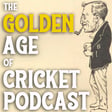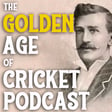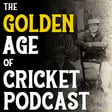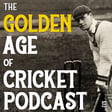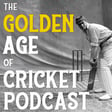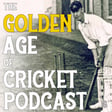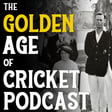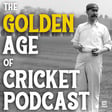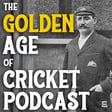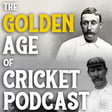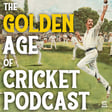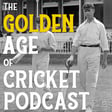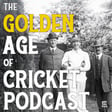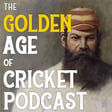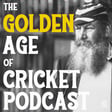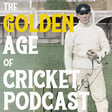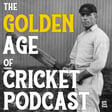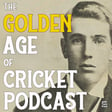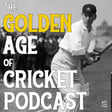Introduction to the Golden Age of Cricket Podcast
00:00:07
Speaker
Hello and welcome to this episode of the Golden Age of Cricket Podcast, where we take a trip back to the late Victorian, early Edwardian period and visit some of the greats of the cricket field. My name is Tom Ford.
00:00:21
Speaker
The subject of today's podcast quite simply was cricket in the 19th century.
WG Grace: More Famous than Queen Victoria?
00:00:27
Speaker
So large was the figure of William Gilbert Grace, both physically and figuratively, that he was known throughout the British Empire simply by his initials, W.G. And it's believed at one point he was even more famous than Queen Victoria.
00:00:43
Speaker
With his large domineering physique and his idiosyncratic beard, WG Grace dominated the sport of cricket like no one before or since, including Donald Bradman, and was central to transforming the sport from a leisurely British pastime to an international spectacle.
Richard Tomlinson on WG Grace's Celebrity Status
00:01:01
Speaker
Few if any cricketers have created as many headlines as WG, and my guest today will attempt to explain why.
00:01:09
Speaker
Richard Tomlinson is a British historian and journalist whose biography of WG Grace was published in 2015 on the 100th anniversary of the great cricketer's death. In Amazing Grace, The Man Who Was WG, Richard set Grace's on-field achievements in the context of his life and times as arguably the most famous celebrity in the English-speaking world. Richard, welcome to the podcast. Thanks. Thanks very much for having me.
Challenging Traditional Views of Grace
00:01:40
Speaker
pleasure. um How and where did you begin researching the life and times of WG Grace? Well, the peg was obviously the the centenary. um And I should say, as you've just mentioned, I'm i'm not a cricket writer by profession. I've never written about cricket before. um I mean, nor have I played cricket to a particularly high level. I was just a club cricketer.
00:02:05
Speaker
but cricket fan for sure. So my background is in journalism and and history and I was obviously well aware and I'd read quite a few of these books over the years that ah masses have been written about WG.
00:02:22
Speaker
And a lot of it is very good. um But I felt from other research I'd done that there was an opportunity actually simply because of digitalisation, because there's so much about WG Grace that was reported in newspapers, which you could get to laboriously, ah but not easily by going to newspaper archives in Britain, Australia.
00:02:50
Speaker
and actually for WG as well also in in the US and Canada where he toured. but not easily. And what I felt was that that that that I might be able to write something rather more expansive, both about his career and about his life around it by digging into those online newspaper archives. So that's really the sort of background to it. And obviously because I'd been interested in Grace for a long time without really knowing very much about him at the time.
Was WG Grace a Strategic Genius?
00:03:25
Speaker
You said just then that obviously there is masses of writing already on WG Grace going back to during his career and then obviously ever since. Was there anything new that could be written about Grace or was it a matter of trying to right long-standing wrongs? This is a really good question and ah it's going to require fairly long answer, but do interrupt me. Because i know i think it as long as you want I think it goes to the heart of it.
00:04:00
Speaker
I should say that there is one book from the pre-internet age, and it's not often quoted um in ah Grace literature, shall we say, by somebody called Joe Weber, and it came out in 1998. It's called The Chronicle of WG, and it's the most amazing
The Comprehensive Game List by Joe Weber
00:04:19
Speaker
piece of research, and I think there's a copy of this book in the Melbourne Archive.
00:04:24
Speaker
And what he did was to literally chronicle from newspaper cuttings every single first-class and non-first-class game that WG had ever played. So that is an amazing resource. And a lot of what you see on the internet now comes from that book. And there's a lot else in it as well, but it took him ages. And the point was that you couldn't really get into this stuff very easily without word searches and so on and so forth.
Grace's Modern Thinkers Comparison
00:04:55
Speaker
So that that coming back to the point about whether there's anything new to be said about grace, I think what I came to the research with was a sort of feeling that there was a received view of grace that had been passed down over the decades.
00:05:13
Speaker
which saw him firstly, and this is the first point, as some kind of sort of village rural simpleton. And that it was somehow, he was he was not an intelligent man and had not really, he was rather superficial. And this just seemed to me to be in the light actually of quite a lot of modern cricket writing and reporting.
00:05:37
Speaker
Not right. And I don't make any apology here for for saying that a lot of my comparisons are going to be with modern cricketers, because I think if you go forward more than a century and you come to the sort of modern era of cricket,
00:05:53
Speaker
take someone like Shane Warne. Now, no one would say that Shane Warne off the field was the kind of chap who would sort of pick up a long novel by Tolstoy or, you know, have a sort of serious intellectual discussion about something. But boy, if you were batting against him, it was like taking a PhD in batting, you know, because the guy just really, you know, thought him and he was a thinking cricketer. Now that to me,
00:06:22
Speaker
was my starting point with Grace, that I i was sceptical, if you like, of this this view of him which had come down right from the beginning in the the way that he was written about, often by people who'd been at Eton and Oxford University, that he that he was somehow simple, and he really wasn't simple, and he You can prove that he had a brain ah or that he was a thinking person just by an educator, just by looking very briefly at his his biography, I mean his school, for instance, where he grew up in in on the outskirts of Bristol.
00:06:57
Speaker
It was a good school. it was ah It was a school for boys who were going to go into ah the trades, into medicine like him. And he got much more than the three hours from that school. And I had a bit of fun in my book pointing out that actually His great friend, Lord Harris, who went to Eton and Christchurch, Oxford, arguably had a worse education than Grace. there's ah There's another thing that I think is often misunderstood about Grace, which is he he went to Bristol Medical School for his training and people said, oh, yeah, he must be a real old saw bones. And he wasn't.
00:07:34
Speaker
He was certainly on the basis of ah that particular phase of his medical training. His his surgical tutor ah was very advanced. um So that's the next thing I would say. And I suppose the last thing, which is always cited when people are talking about Grace as this sort of simpleton,
00:07:52
Speaker
was that people said he never read a book in his life, which is nonsense. he He actually had lots and lots of books. I mean, you can prove that in his parlour, in his sitting room, ah in his last house where he lived but in the early 1900s.
00:08:09
Speaker
so And a lot of those books were about cricket. So that leads to the second point, which is that John Arlott, I only name him because he was a very, very fine cricket writer. um But he too, and this has been sort of the view of Grace, I think, right the way down the line. He referred to to Grace in the radio program he produced in 1948.
00:08:36
Speaker
as an instinctive cricketer, that it was all instinct, it was all somehow something that was just in him. Well, let me tell you, that is totally untrue. I mean, he he never was there somebody who thought more clearly and analytically about batting, which was the great subject of his life.
Grace's Progressive Batting Techniques
00:08:56
Speaker
And you can you can demonstrate this in all sorts of ways. And so I think i think that what I what i then came to feel from doing the research for this book was that, in a way, I know this this series is called The Golden Age of Cricket, but it's, for Grace, it is the correct lens, but it's also, because he, we can come to this, he was, you know, absolutely essential to there being such a thing as a Golden Age, but he was tremendously modern as a cricketer and in his outlook, and I pulled out one quote
00:09:32
Speaker
And he wrote it himself, ah just to give you an illustration of his thinking about batting. And it's just a piece of advice. you know in I think it came from the boy's own book that he wrote about cri cricket. And he's talking about blocking. And he says, I quote, when you block, infuse a little power into what you do and do not be content to stop the ball by simply putting the bat in its way.
00:10:01
Speaker
anyone can do that, but try and score off it too. Now to me, that's Joe Root, Ricky Ponting, you know, any any of the modern greats, you will see them do that, but you didn't see them do that in in Grace's time. So if you want the short answer to, is there anything new to be said about Grace? The answer is I think lots. um And it comes down to these three core things.
00:10:28
Speaker
very interesting listening to you debunk the idea of him as a simpleton.
Dual Life: Cricketer and GP
00:10:34
Speaker
And shame shame on me in my introduction for not actually referring to him as Dr. W.G. Grace, because we forget, of course, that as you mentioned, he was he was a practicing GP. We're going to get ah to how often and how much he enjoyed the practice of being a doctor later in the podcast. sure And again, that might help us put his cricket in in perspective.
WG Grace's Personality Evolution
00:10:59
Speaker
Richard, was there any ah one thing? I'm sure there were many, but was there any one thing in particular which really so surprised you in your research? What I would say about that is that he
00:11:12
Speaker
it's a good thing really because i i didn't I didn't know very much about him as I said beyond the outline of his amazing cricket career and I deliberately did the research chronologically so I started at the beginning and I didn't get ahead of things I just went through from his early years after he was born in 1848 growing up in Gloucestershire all the way through the great period of his cricket career to the sad decline and then his last years playing club cricket in South London and the thing that surprised me and I have to say it relieved me somewhat is that he changed and if you think about anybody that's that's quite an obvious thing that happens as you grow older is that
00:12:00
Speaker
you know many people change a lot ah but in Grace's case as a biographer it was a relief because he's extremely obnoxious in many ways as a young man and that that is actually part of his box office appeal I mean he just does not do anything He doesn't play cricket in the way that he was supposed to. he doesn't He doesn't approach it because he's just out to win. And there are so many examples of his bad behaviour and they're they're well known. but So he's tremendously obnoxious. He then does this tour of Australia in 1873-74.
00:12:40
Speaker
And for me, he's totally out of his depth. I mean, a lot of what went wrong with that tour wasn't his fault. And I'm afraid to say it was the fault of the ah promoter in Melbourne, a guy called William Biddle, who really he was a failed gold speculator. But a lot of it, ah particularly the man management of the professionals, it was Grace's fault because he just was hopeless at it.
00:13:04
Speaker
And there was one image where he's getting on a ah boat of some filthy oil steamer, taking them back to Melbourne along the southern Australian coast. I think he's getting on it, forgive the mispronunciation, Warrnambool. Warrnambool, yes. Yeah. And one of the professionals, Southerton, who's keeping a dowry,
00:13:28
Speaker
He watches us as Grace gets onto the boat and he's he's drunk. He's carrying two dead kangaroos that he's shot as trophies. and he goes down onto the deck and he gets out his shotgun and he starts taking pop shots at the seagulls um and at that point I thought I'm not really sure how I'm going to be able to carry on ah sort of i'm sort of coexisting with this guy while I do the research because I haven't seen very much so far that's likeable
00:14:01
Speaker
and yet by the end and we can come to this he is to me he is so endearing and also inspiring actually um and the the wonderful thing about that as well is that it it coincides of course with the golden age but also with his own decline so it becomes a very very interesting complicated story of how and why he changed. um So that was the thing that I'm glad to say it did surprise me because in a good way because I found him more and more interesting the older he got.
WG Grace During the Golden Age of Cricket
00:14:40
Speaker
And I should warn the listeners of today's podcast that just due to the vastness of Grace's life, but also the nature of this podcast, we will really only be focusing on his life and career in the so-called Golden Age. We won't be talking too much about his early life, although we may reflect on it at some point.
00:15:03
Speaker
Richard, can we ever truly ah understand had the sheer vastness of his celebrity?
Grace's Global Celebrity and Charisma
00:15:11
Speaker
You mentioned in your book that he's he has fans ranging from everyone from an American Civil War general to King Edward VII. Can you answer just how famous he was at one point in his career?
00:15:27
Speaker
Well, he I tried to do it in all sorts of different ways because you can you can measure it in terms of newspaper references in terms and there are just tens of thousands. I mean, you you never get to the end of them and I'm not pretending that...
00:15:41
Speaker
I've read all of them. um And also that just the sheer range of people who sort of regarded themselves as Grace's, you know, they were fully signed up members of the Grace Fan Club. I mean, all the way from an American Civil War general ah when he was touring the Canada and the United States in 1872.
00:16:04
Speaker
Two children at the end of his life who used to wave at him as he passed through the street on his way to playing playing golf. So he had this extraordinary range. I mean i think the question of why he did is very difficult to unpack because he obviously had you know, who's this huge man with a beard. I mean, he's instantly recognizable, but there were other huge men with beards, you know? I mean, it's it's not it's not the end of the explanation. And i the only way I could do it really was through anecdotes, which didn't, and glimpses of him, which didn't really sort of, which just showed the different ways in which people found him tremendously charismatic. And one of my favorites
00:16:53
Speaker
was a true story about a little girl whose plan she's called Mabel Catley and this is just to illustrate his star power um and he's playing in the Scarborough Festival in Yorkshire and I think it's 1889 so he's all he's sort of on the cusp of his just his great decline and it's the lunch interval and she's out there she's nine or ten and she's playing on her own with a little bat nobody's with her everybody's having lunch and this this huge man walks up to her and looks down at her and he says i would like to play with you if that's okay
00:17:38
Speaker
and she gives him her bat. And for the next five, 10 minutes, he plays with her. He bats with her as she bowls under him. She remembers it for the rest of it her life, which is a long one.
00:17:51
Speaker
everybody and in the crowd remembers it and he just had this extraordinary charisma and I guess you could say a sort of common touch that meant that in crowds he was recognizable but he was also just a ah kind of magnetic person added to which we can come to this, he was absolutely the greatest cricketer of the age until we can come to this as well. Of course, he started to be surpassed by a whole series of Golden Age batsmen, Rajat Sinji Frye, others, and Faded.
00:18:36
Speaker
feel i If you're enjoying this podcast, perhaps you'd like to support it by buying me, Tom Ford, a coffee. Every little donation helps with the production costs and also inspire me to keep going. You can support by donating as little as $5. Visit buymeacoffee.com slash golden age of cricket.
00:19:26
Speaker
Let's start with um the beginning of his career, well, sorry, not the beginning of his career, but his career at the beginning of the Golden Age, which if we take as the ah imaginary bracket as having begun in about 1890, so he's in his 40s, early 40s at this stage, having already played first class cricket for decades and test cricket ah for a few years.
Grace's Weight and Performance in Later Career
00:19:52
Speaker
as anyone who's read your book will see he's referred to at this point in time as the grand old man the grand old man of cricket um but as you put it in context grand at this point in time can often mean fat uh rather than the more stately reference um and of course he's put on quite a bit of weight he still has obviously his height but he's he's this sort of expanded outwards. um Did he simply drink and eat too much, do you think? Well he did, and he knew it as well. He was very embarrassed about it. um And i I was looking again at what I wrote about why he did this, because I think you do have to remember first of all that in his youth, if we're talking about the 1860s, you've got someone who is who's a fantastic athlete,
00:20:47
Speaker
I mean, i been and he could be a top athlete in the sense that he's a top hurdler and sprinter. So you have to imagine someone who is, I mean, he's six foot two.
00:20:58
Speaker
And he's probably, you know, 12, 13 stone. He's very shy about giving his weight to anyone, but the sort of best guess, pretty reasonable guess, I think, is that by the late 1880s, he is probably pushing 20 stone, maybe 18 stone, somewhere in that range. If you look at if you look at the ah pictures of him and what people said about him,
00:21:27
Speaker
And he he he knew that he was overweight. I mean, there are these stories that his Gloucestershire teammates told about him going to the Turkish baths in Bristol and trying to sweat it out, which is a doctor, you know, he should have known that that was sort of not going to work. And I think the question is, why did he do it? And in the book, I like sort of possibly over theorized this because I said that he you know, possibly it was to do initially the eating anyway and actually the drinking with the the sort of just the competitive pressure ah that he was finding from no longer being absolutely the greatest. There's this sort of conveyor belt of batsmen who come through in the 1880s and then the 1890s. I think probably starting with Arthur Shrewsbury of Nottinghamshire, but by the 90s you've got Ramjet Sinti Fry and you can
00:22:24
Speaker
You can add the Australians who are coming to the force. Trump, Hugh. Exactly, exactly. And they're all basically, he has set the standard, which they're all trying to be, I think is the way to put it.
00:22:37
Speaker
And then the other thing, which we can talk about as long as you like, because I find it very interesting, but i mean he he and and it's terribly sad, was was the the the sadness in his own private life of losing two of his four children early. So this would be talking about the 1890s and early 1900s.
00:22:58
Speaker
What I feel now is that I'm possibly sort of over theorizing in the sense that I think it was just compulsive. I think he just had that nature and he just ate and he claimed to have been a tea total in his youth and it's quite funny the ways he tries to sort of hide the fact that he's a drinker in his memoirs but there are too many stories which speak to the fact that a lot of the time I didn't dare write it in the book but I think probably by the end of his life he's an alcoholic I mean he's he can hold his liquor because he's so huge but there are so many glimpses of him just drinking at odd times and drinking huge quantities as well
00:23:39
Speaker
um So yeah, he you know, in and it's and it's tragic in the context of the Golden Age because he's not that old. You know, like you say, he's he's only in his early 40s when they hit the Golden Age, 1890, it begins. And he could have been even greater, if you like, than he was because, you know, he was doing it increasingly from, if you like, muscle memory, but he was still good enough at batting to have this one great summer in 1895 And still, even after that, from time to time, turned it on. But he was by then, yeah, a heffa-lump. And not, most definitely not, sort of in the top flight as, as ah you know, as ah as a great batsman. because he was He was on the decline.
00:24:29
Speaker
Yeah and we and we have to remember in this very highly professional age that we are talking in, this is a good hundred years before the idea of having team dietitians and you know I mean the idea I think of nutrition was around but it was probably not what modern nutritionists would approve of. yeah Even though he had that um science, medical a background. I think possibly his diet wasn't too different from what many of the other cricketers were doing. um But perhaps he maybe just enjoyed it, indulged in a little too
Financial Struggles and Exploitation
00:25:05
Speaker
much. For sure, for sure.
00:25:07
Speaker
So Richard, for someone like Grace, who in the 1890s had his status and, you know, we've already touched on his very iconic appearance, the beard and the red and yellow hat, for example, cap. um It turns out he was very hopeless at marketing himself. Yeah. Many, many of his ventures and advertising campaigns that he lent his face and name to failed. Why do you think that was? so It's another good question. I think that the subject of grace and money is obviously also tied up with this whole thing about his undoubted shamaturism. I mean, he played a lot for money. and that But whether he actually earned a lot is um is a more complicated question. But if you're just coming back to grace and
00:26:03
Speaker
why he was no good at marketing himself, given that he did have this incredible staff power. um I think the first thing is that he certainly, he was legitimately pissed off that everybody else seemed to be making money out of him and he could seem to sort of hold on to the staff himself or or make as much money as as he thought he should. um And by the way, the everybody includes the MCC. I mean, they literally built a grandstand because of grace and that was even before he was a member of the club and then they thought we'd better get him into the club um so i think that's the first thing i think in terms of his background he comes from this this this but this family of bankrupts and his his wife who's a second cousin agnes
00:26:55
Speaker
Her father goes bankrupt. He's actually quite an eminent Victorian lithographer. He's well known in that work world, but he he he goes bankrupt um before he marries her, I think. And yes, that's true. And so he's surrounded by by family who are all no good with money. There's no there's no real sort of role model for him.
00:27:18
Speaker
And he's he's just sort of nervous about about money. So I think he's got that kind of, I was trying to think of a sort of contrast. And actually, I think Brandon would be quite a good one because you could never imagine WG Grace as a stockbroker, which was what Brandon sort of notionally became of season. um So he was he was just no good with money. um And then I think the other thing,
00:27:44
Speaker
which is also true in this respect, is that he thought he was very, very interested in playing as much cricket as he possibly could anywhere. um But what he wasn't good at was putting the time and effort into figuring out, well, if Colman's mustard is going to rip me off, perhaps I need somebody, an agent really, who's going to help me deal deal with all of the stuff. And he didn't he didn't operate like that, WG. Everything had to be done through him.
00:28:14
Speaker
um And he was very difficult to negotiate with because he was always off playing cricket and so I think that would be for me the third reason is that he he was just ah He was not a ah natural businessman So it's not I think perhaps that's not a totally satisfactory answer, but I think that the totality of it is that he a lot of money passed through his hands at various points in his career, these two huge testimonial funds. But as soon as he gets this money,
00:28:47
Speaker
He does strange things like he asks the MCC with the second fund in 1895. He he sort of almost gives it back and says, so can you invest it for me? i mean he just does He just doesn't want to have anything to do with it. So he's a kind of odd and contradictory in this respect. um he He wants the money, but he doesn't really know how to do it how to deal with it.
00:29:08
Speaker
Yeah sure, I mean that does make sense but again he's he's not really the only cricketer that I can think of from the golden age who's quite terrible with with money. um It seems like it's almost recurring. I mean again ah we're we're thinking in modern terms where modern cricketers are just surrounded by dieticians and psychologists and probably financial advisors. He's not and he's definitely not modern in this respect. I mean, there there there is one story which I am fairly sure is true, because it was told by several sources where
00:29:44
Speaker
He's walking down the street with some friends in Bristol, in the eighteen I think it's in the 1880s, and he sees this kid across the street, some teenage kid, who's smoking a WG Grace novelty pipe.
00:29:59
Speaker
and it's got the image of WG on the pipe and and Grace is really curious about this and he crosses the street and and he sort of says go oh I'll have a look at that and he then he's chuffed enough that the boy is smoking a WG Grace novelty pipe that he says to the boy I'll buy it off you So he actually wants to buy his own image of a boy who's bought a pipe that from a company that has ripped off his image. He's that far away from being savvy about money. yeah So it's quite sweet in a way, in some respects.
00:30:39
Speaker
But again, yeah, it's again, we're in this world where we immediately think he should head to the manufacturer and demand, you know, royalties or whatever, but he he does have that sweetness about him, which I think... Yeah.
00:30:53
Speaker
It sort of leaves him as an endearing in endearing character and is possibly why we enjoy talking about him 150 years later.
Challenges on Australia Tours
00:31:01
Speaker
Richard, you've ah you've already mentioned the first tour he took to Australia, so he makes two in his career, the first one in... 1873-74 when he's really at the pinnacle of his playing career he's still quite young and he's in great form and this is in between shooting kangaroos and seagulls as you mentioned but but he makes a second tour and this one takes place right at the dawn of the golden golden age he comes over for an Australian summer in 1891-92
00:31:35
Speaker
and again it's almost an identical process as in he's heralded as this you know the champion the greatest cricketer of all time by the Australian press and then through various actions not all as you say completely his own fault hes He somehow riles the Australian crowds and by the end they're basically kicking him out of the country and saying, yeah you know, you're you're not who we were promised. And, um you know, they're sort of mocking, certainly in the second tour, they're mocking his fielding efforts because he is older and quite unfit. So why did Grace agree to this second tour in the 1890s?
00:32:17
Speaker
I mean, I think in terms of his unfitness, I'd actually forgotten until like I went back and had a look at my book. He he had a problem with his knee. I mean, that was that was um probably made him seem older, if you like, than he perhaps was on the cricket field. I mean, we can come to that when we talk about 1895, his great year. But in terms of the Australian,
00:32:44
Speaker
tour. Well, I think the reason he the reason he agreed to do the tour was money. I mean, he was and he was paid, I think it's 3000 pounds, which was an enormous amount. I mean, that was the sort of that was double, I think what he was he was paid in 1873 for. seventy three four and It was also guaranteed money in the sense that it was coming out of the pocket of this strange character, Lord Sheffield, who gave his name for the Sheffield Shield. He did, yes, which we still play for in Australia, yes. And he ah he was absolutely... Sheffield was absolutely loaded and... That was the first thing. What I would also say is that the reason the tour happened was because of W.G. Grace. I mean, the Australians had been trying almost every year really to get him to go back to Australia. And there had always been reasons why he couldn't do it. And one of the reasons being that he was having a very difficult time with the poor law union in Bristol that employed him as a doctor and they didn't really like the idea of him.
00:33:56
Speaker
going off. It was a one thing to hire locums in the summer so he could go off and play for Gloucestershire. But it was quite another to sort of say, well, by the way, I'm going to be away for five months in Australia. so But then eventually he does go. And I think the the reason is ah simple. it it's It's money. um Nothing more, nothing less.
00:34:17
Speaker
The thing about the Australian crowds, it's an interesting one that because that's where looking at these newspaper reports is so interesting because there's an awful lot of commentary and this is true particularly in 1873-74. There's a famous game where in Sydney where it's a combined Victoria New South Wales team And Grace gets up to some sharp practice because he's he wants the the last day to start earlier because said that they've got a chance of beating. I think it's sort of some ridiculous number of 22 of you. Something like that. And he does it and then he buggers off and he doesn't sort of hang around.
00:34:58
Speaker
as was quite often the case with Grace in Australia. But there's all this commentary in the newspapers about how awful it is, how terrible, you know, the good riddance to bad rubbish. But there's also a newspaper reports, you see, the crowd absolutely love this. And they sort of afterwards, you know, they sort of love hate thing, that they they they love to hate him, but they love the fact that he puts on such a good show.
00:35:21
Speaker
um And I think this it's sad in 1891-1992, because he's he's not easily, that the best English batsman, Arthur Shrewsbury, isn't on the tour. The best batsman in the team, I think, is probably Stoddart, who is sort of on just reaching his prime.
00:35:40
Speaker
of for And Grace himself, I think he scores goes a bit, but he doesn't he doesn't make any sort of huge runs. And yeah, you're right. I mean, they they they cannot believe how fat and old this guy looks. um That's the first thing the Australian press say when they they they see him after the ship gets to Australia. He's just enormous.
00:36:00
Speaker
um so So... It is, I mean, I say in the book, it's the the the title of the chapter, it's a tour too far. And I think it was, except of course, he made very good money out of it, because it as a cricketer, it didn't do his reputation any good at all. And that's when there's a lot of the sort of commentary starts surfacing about he shouldn't have been he's not worth his place in the team. It was already being said before before he left. And he never he never quite shakes that off.
00:36:33
Speaker
Yeah no it's a really interesting part of his the later stage of his life and career is this trip to Australia and I encourage any of my listeners if you're not familiar with it to well first of all read Richard's book of course but also look up what happens on that tour because you know here is the elder statesman of the game of cricket coming to Australia at a really interesting
Family Life and Tragedies
00:36:58
Speaker
time. ah Richard, one of the things I really enjoyed about your book was how you weaved in his domestic life and spoke about his family. You've already mentioned his wife Agnes. WG had a number of children, um which couldn't have been easy, I'm imagining being the children of
00:37:18
Speaker
one of the most famous people in the world at that point in time and a number of them struggled being in that sort of in the spotlight, particularly his older son who was also known as WG, he was WG junior. What can you tell us about that father-son relationship in particular?
00:37:37
Speaker
Well, the the first thing to say about Bertie, as he was always called, WG Junior, is that it's a bit prurian, but I managed to figure out that he was probably conceived while Grace was sailing to Australia with his new wife, Agnes. I reckon around about the Bay of Biscay, or as they were sailing through the Mediterranean. And I'd like to put put in a word for his wife, Agnes, who Among his many mistakes on that tour was that he he underestimated his pregnant wife who he tried to just dump in Melbourne and he did once while he went upcountry to play in these terrible games of cricket against 22 of Southampton.
00:38:22
Speaker
14 of somebody else and she clearly didn't like it because for the rest of the tour going all over the place she accompanied them pregnant with Bertie wherever they went Agnes was there so she was a very plucky interesting woman in her own right Poor Bertie. I mean, it you're right. it was It was really difficult. I mean, I put for him, i because he was the son of the greatest cricketer, the greatest batsman of all time, and Grace was
00:38:56
Speaker
it's it's odd this because I think there are other examples you can find it's quite a common type because he loved children but he he was a bad father in the sense that he just particularly with his sons not his daughter Bessie because he he couldn't imagine what it was like not to be him I think that's that that ah like him so Bertie is always striving to be his father's son or he's always being expected to be so. And there's this really tragic picture of him posing to bat, which I put in my book. And it's it's hard to describe on a podcast. this Is this where he's ah he's at the wicket and he's he's standing almost vertical and there's no... is this the Yeah, it's terrible.
00:39:46
Speaker
it's terrible and it's just like ah my caption which was a bit cruel was how not to bat because almost everything is wrong about it he still manages to just about get an oxford blue he'd a cambridge blue sorry he goes to pembroke college cambridge in WG's great year he scores 40 odd in the Varsity match at Lord's in front of WG but I think that um really you can sum up Bertie by his problem the following year in 1896 when he's 22 more or less
00:40:23
Speaker
and he goes out to bat for Gloucestershire against Sussex. Billy Murdoch was playing for Sussex, I think. Yeah, he would have been at Bristol. At WG Grace Junior, Bertie gets out for one, and he then has to spend the next day and a bit watching his dad score a triple century. While everybody's in to him, you can be sure. What a tremendous inning! your dad is playing and what rotten luck you got out so young. And he is nonetheless, you know, he obviously in a different way, he has some ability. I mean, he he ends up as a maths teacher at a public school and then the Naval College on the Isle of Wight.
00:41:07
Speaker
And he plays quite a lot for W.G. Grace's team in in in London, um South London in the early 1900s. But he dies young after a botched, what sounds like an opera, ah he got appendicitis and it's not very clear, but he dies on the operating table. So he dies in, I think it's 1905.
00:41:29
Speaker
um it's a sort of sadly unfulfilled life. So that's Bertie, um not a happy life, really. You alluded to this at the opening of the podcast, how it's another chapter in Grace's life, for an example, where his life is accompanied by tragedy throughout. And he does he does seem to mourn those really close to him. I mean, when his brother, Em, m dies in I think 1911 or so, who was another very great cricketer, yeah not at WG's level, but was certainly one of the prominent batsmen in the 1870s, 1880s. You know, Grace wears like a black armband for weeks and weeks. And um again, really... He feels it terribly. And he's also, I mean, I think there's two things there. One of which is that one just has to sort of get over this idea that Grace was some kind of jolly giant.
00:42:28
Speaker
He really wasn't. I mean, I think a lot of the time, particularly laterally, he was very unhappy. I mean, one can avoid, you know, clinical questions about whether he was pressed, but he was clearly, there was a huge amount of sadness in his life. And I think what is also very moving is that he did, yeah, he did feel both the losses of his family, EM, m with whom he had quite a complicated relationship anyway,
00:42:56
Speaker
um but also friends as well and I came across what I thought really summed this up well when a Gloucestershire committee man, an actually publisher of of some of, he published one of Grace's books, um possibly more than one actually when I think about it, called Aaron Smith, his wife had died and Grace wrote this perfect condolence because the letter of condolence where in that situation, if you're the recipient, you do not want someone to say to you sort of, you know, some twit to say sort to start talking pompously about all sort of, you know, your terrible grief and all the rest of it. And all Grace wrote was that Mrs. Grace and I know what it feels to lose those who are dearest to us.
00:43:44
Speaker
Just that and it was just to say I know how you feel mate, you know I'm not gonna say anymore and he just left it that and and by that stage he'd lost two of his children um so That to me is quite an important dimension of grace that that you don't see until laterally in his life when there's so much sorrow and grief

